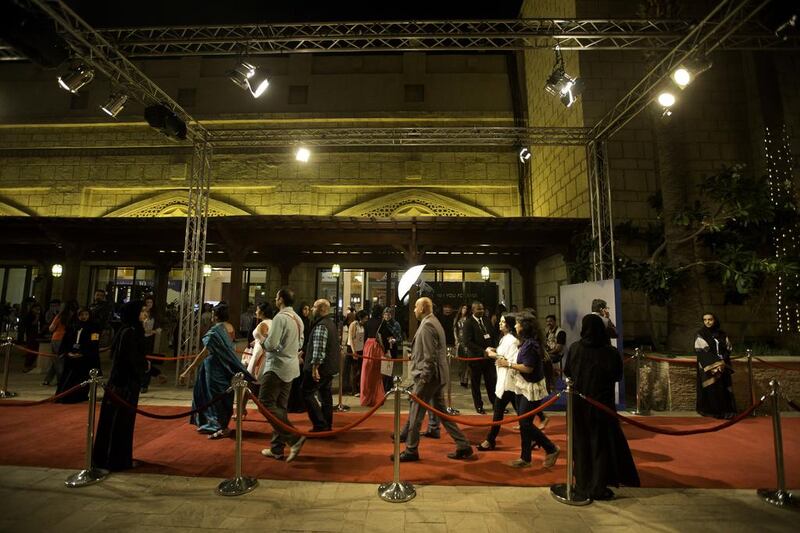Dubai International Film Festival is seeking to reassure the industry following claims in US film industry magazine Variety that huge cuts will see the festival undergo "drastic downsizing" for this year's 11th edition in December.
The festival said that it is set to scrap the Dubai Film Connection co-production platform, the Muhr Asia/Africa Awards section and its Interchange lab and fund that sent writers to Europe to work with their local peers. The festival’s managing director Shivani Pandya, while unable to comment specifically on budget cuts, insists the changes are a simple case of evolution, however: “Following DIFF’s decennial [10th] edition we have revisited the strategy to look at ways that will guarantee DIFF continues to evolve, grow in strength, size and stature,” she says. “Like any cultural event we have made some changes to the festival to ensure we continue to contribute to driving industry growth, build audiences and a vibrant film culture in the UAE. The budgets of the Dubai International Film Festival have been redistributed within the festival this year to focus on new initiatives that will continue to support Arab filmmakers and improve the visibility of Arab productions.”
Much of the Variety piece was based on the slightly baffling notion that Samr Al Marzooqi, head of Dubai Film Market, which oversees much of the production and funding side of the festival, has "confirmed ... without comment" that changes are taking place. Speaking to The National in the run-up to ADFF, however, Mr Al Marzooqi was happy to confirm these changes "with comment".
While he admitted that some focus is to be taken away from the festival’s mission to fund new productions, the Enjaaz fund, which has supported seven of the 18 films set to screen in the Muhr Arab section this year, remains unchanged. The Film Market itself, meanwhile, is poised to focus on the area of distribution.
"The Film Market is making some major changes," Mr Al Marzooqi said. "Arabic filmmakers faced so many issues at different stages of production when we started eight years ago, and we were created to try and help as no other bodies across the region were doing that at the time. We've helped a total of 243 films to be made so far, including Wadjda, City of Life and Theeb, which screened this year at the Abu Dhabi Film Festival and just won its director, Naji Abu Nowar, the Orizzonti Award for best director at Venice as well as the Variety Arab Filmmaker of the Year.
“In the beginning, the reason for the Market was the need to close those gaps. Over the eight years since, other entities across the region began to offer similar [programmes], but there are still areas that no one is tackling, so we are changing our focus. We’re not looking so much at developing Arabic films any more, but rather filling the gaps regarding distribution, sales, acquisition and TV. For eight years we’ve helped with everything up to distribution then stopped. Now we want to look at what happens when you’ve finished your film.”
Evidence suggests Mr Al Marzooqi's logic is solid. One of the biggest international Arabic hits of recent years, for example, is 2013's Oscar-nominated Omar. No regional distribution deal has ever been signed. BAFTA-nominated Wadjda has met with a similar fate, and regional distributors and audiences seem sometimes indifferent to local films.
“We can’t really talk about a proper industry till we close the whole circle, which is what we’re doing by looking to improve the distribution side. We can’t just keep funding films that no one ever sees,” Mr Al Marzooqi said.
With this in mind, the festival has already signed a deal with some of the region’s biggest distributors, including Gulf Film, Empire, Front Row and Vox, which will see each picking up at least one locally produced film from this year’s festival, which runs from December 10 to 17.
As regards the demise of the Muhr Africa and Asia awards, the festival says that, far from a cutback, this a recognition of how much content is now coming from the Arab world. The official line is that DIFF’s award slate had simply grown too large and cumbersome, and with an ongoing increase in the number of Arab films submitted — last year saw a 50-per-cent year-on-year increase in Emirati submissions alone — it was decided that the focus should be redirected to the Arab world.
The rumour mill surrounding DIFF’s declining fortunes has not been helped by the indefinite postponement, which looks increasingly like a cancellation, with no explanation, of this year’s heavily locally focused Gulf Film Festival in April, which is also run by DIFF. Pandya would not comment on its future: “Supporting filmmakers from the GCC remains a priority for us, and we continue to nurture and develop projects through our Enjaaz programme and there will be a diverse and rich selection of the latest films from the GCC at the DIFF this December. The status of The Gulf Film Festival is currently being reviewed and we are not in a position to confirm at this point.”
cnewbould@thenational.ae






